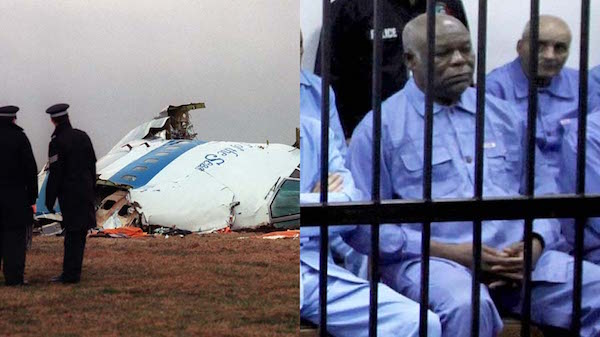The abduction of a former Libyan intelligence operative accused of preparing the bomb that brought down Pan Am flight 103 over Lockerbie, Scotland, in 1988 and his transfer into US custody raises concerns about a renewed willingness in Washington to flout international law to hunt alleged terrorist fugitives, The Guardian reported.
The family of Abu Agila al-Marimi, who appeared in a US courtroom last week, have described how the 71-year-old was “kidnapped” from his home in Tripoli’s Abu Salem neighbourhood around 1am on 17 November by armed gunmen sent by a notorious local militia commander. He was then held by another militia for two weeks before being handed over to US agents.
The case recalls the excesses of the “war on terror” which saw dozens of so-called renditions – clandestine, illegal transfers of suspects by US intelligence services.
Abdel Moneim al-Muraimi, Masud’s nephew, told the Observer that his uncle had been unlawfully abducted. “We have filed a complaint with the attorney general’s office and demanded an investigation of the people who kidnapped him and those who handed him over. We want them to face justice. This is an assault on a citizen in his home,” al-Muraimi said.
Diana Eltahawy, Amnesty International’s deputy regional director for the Middle East and North Africa, said: “We have long called for accountability for crimes [including the Lockerbie attack] under international law but this has to be done in a manner that respects due process and upholds fair trial rights. In this case even a facade of legality was not maintained … there was no hearing for [Masud] to challenge the lawfulness of his detention and transfer.”
The exact legal justification for the transfer of al-Marimi is unclear. Libya does not have an extradition treaty with the US, no court is known to have considered any request from Washington nor from the government of Libya, and there is no record of any warrant issued for Masud’s detention. Libyan officials have cited an Interpool warrant.
“This is clearly illegal under Libyan law. It was very obviously an extraordinary rendition contrary to international law,” said Jason Pack, author of Libya and the Global Enduring Disorder. But in a televised broadcast on Thursday evening, Libya’s prime minister, Abdul Hamid Dbeibeh, said Masud’s extradition was lawful and his government was cooperating with an “international judicial framework to extradite accused citizens”.
Libyan officials with knowledge of the case told the Observer that Masud was seized by gunmen loyal to Abdel Ghani al-Kikli, known as “Gheniwa”, an infamous local militia commander who controls the capital’s poor, crowded Abu Salem neighborhood.
“Several armed vehicles filled with armed men arrived at his house … and kidnapped him. My father and my uncle’s other brothers live on the same street so we went out to see what was going on, but they threatened us with weapons. It was terrorism, real terrorism,” said al-Muraimi.
Al-Kikli has been accused of human rights abuses. Amnesty has documented disappearances, torture and unlawful killings while a UN report earlier this year described “beating by guards, denial of medical care, starvation and enslavement practices” by al-Kikli’s militia at a migrant detention centre west of Tripoli.
Libyan sources in Tripoli said Donald Trump’s administration officials had been in discussions with local authorities about bringing al-Marimi to the US to stand trial since 2019. These “conversations” had continued under Joe Biden.
In July, powerful individuals within the Tripoli-based Government of National Unity (GNU) contacted US government officials and offered to hand al-Marimi over despite his recent release from prison. The 71-year-old had been serving a 10-year sentence for crimes while an intelligence operative under the regime of Muammar Gaddafi, who was ousted in 2011,
After being abducted from his home, al-Marimi was transferred to a heavily armed paramilitary unit called the Joint Force in the port city of Misrata. The Joint Force was set up a year ago by Dbeibeh to act as a personal praetorian guard and has been accused of human rights abuses, including an extra-judicial execution earlier this year, torture, arbitrary detention and forced disappearances.
After around 10 days in Misrata, Masud called his family who were allowed to visit him in a militia base. “They said, ‘Don’t worry about him, we are taking care of him and will not hand him over’,” al-Muraimi, told the Observer. Two weeks later, US officials collected Masud and flew their captive to Malta on a secret flight and then on to the US, Libyan officials said.
According to US legal documents, Masud was a key figure in the 1988 attack, along with Abdelbaset al-Megrahi, who was jailed for life for mass murder at a special court sitting in the Netherlands in 2001, and Al-Amin Khalifa Fhimah, who was acquitted. Dozens of US citizens died in the bombing of the Pan Am flight from London to New York.
Dbeibeh’s mandate expired last December and he may have hoped to win favour from the Biden administration by giving al-Marimi to the US.
Jake Sullivan, the US national security adviser, said last week that Masud had been brought to the US “in a lawful manner according to established procedures”. But Amnesty’s Eltahawy said that relying on “commanders of abusive militias and armed groups … for law enforcement or special operations only further entrenches their power and emboldens them to commit further horrific crimes”.
Al-Marimi’s relatives are concerned about the health of an “old, sick man”. “As a family, we have been in complete shock. We did not expect this to happen at all,” al-Muraimi said.
